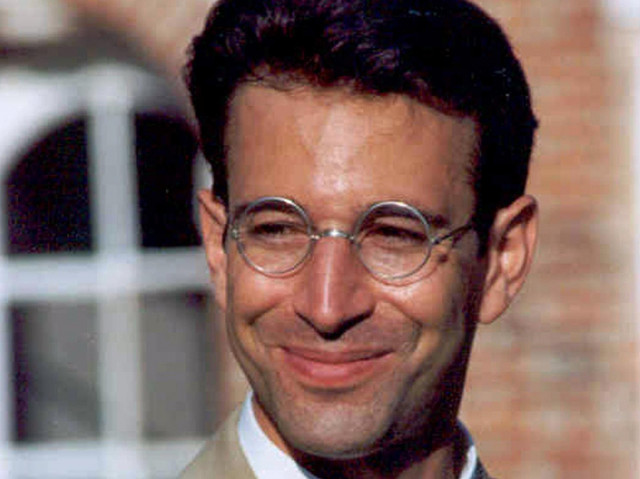SHC overturns convictions in Daniel Pearl murder case
Sindh govt to move apex court against high court judgment

Daniel Pearl, the South Asia bureau chief of the Wall Street Journal, was kidnapped on January 23, 2002, from Karachi, and later beheaded by his captors. PHOTO: AFP
The Sindh government will challenge the judgment in the apex court soon.
A two-member bench comprising Justice KK Agha and Justice Zulfiqar Sangi announced the verdict the reserved earlier on appeals filed by the four men against their convictions.
British-born Ahmed Omar Saeed Sheikh, who was handed down the death penalty by a Hyderabad anti-terrorism court on July 15, 2002 for masterminding the murder, had his sentence reduced to seven years for kidnapping.
He has been in jail for 18 years awaiting the outcome of an appeal.
“The court has commuted Omar’s death sentence to a seven-year sentence,” Khawaja Naveed, the defence lawyer said. “The murder charges were not proven, so he has given seven years for the kidnapping,” he added.
“Omar has already served 18 years, so his release orders will be issued sometime today. He will be out in a few days.”
The high court also acquitted three others in the case, Fahad Naseem, Syed Salman Saqib and Sheikh Muhammad Adil, over lack of evidence.
They were sentenced to life imprisonment with a fine of Rs500,000 each by the anti-terrorism court.
The counsel for the four men contended that the prosecution had failed to provide enough evidence to prove beyond any reasonable doubt that their clients had participated or abetted in the crime.
The convicts had filed appeals in the high court on July 19, 2002, pleading to nullify their sentences and conviction. The state had also filed an appeal seeking enhancement of the three co-accused’s life terms to capital punishment.
A senior official told The Express Tribune that the Sindh chief prosecutor will challenge the high court decision in the Supreme Court soon.
“The provincial prosecution will try to have high court judgment suspended before the release of four men,” he added.
Attorney General for Pakistan Khalid Javed Khan has also contacted the Sindh chief prosecutor for filing an appeal against SHC judgment.
Pearl, the South Asian region bureau chief of the Wall Street Journal, was kidnapped on January 23, 2002, in Karachi and later beheaded by his captors when their demands were not met.
The American journalist was in the city reporting on links between Pakistanis militants and Richard Reid, who tried to blow up a passenger plane using bombs hidden in his shoes.
According to prosecution, Sheikh lured him to a meeting with a cleric. Around a month after the abduction, a video showing Pearl’s beheading was sent to the US consulate in Karachi.
In January 2011, a report released by the Pearl Project at Georgetown University following an investigation into his death made chilling revelations when it claimed that the wrong men were convicted for Pearl’s murder.
The Pearl Project, a group of US journalists, including former colleagues of Pearl, alleged the killer was alleged 9/11 mastermind Khalid Sheikh Mohammed, who is being held in Guantanamo Bay.
Mohammed, who was arrested in Pakistan in 2003, had at one point claimed to have personally killed Pearl, but the admission was made while he was being tortured and he was never charged with the crime.
According to the Pearl Project, federal agents backed up Mohammed's confession by comparing photos of the veins in his hands and the vein patterns of an assailant in the video of Pearl's killing.
In 2014, an anti-terrorism court had acquitted Qari Hashim, a co-accused in the case due to a lack of evidence.
The same year, Sheikh allegedly attempted suicide in his prison cell by hanging himself with a cloth from the ventilator. The then deputy jail superintendent Majid Akhtar had told The Express Tribune that the prison staff thwarted his attempt.
According to BBC, Sheikh was born in London in 1973, where he attended public school before going on to study at the London School of Economics. He did not graduate, failing to return after driving aid to Bosnia after his first year.
He was arrested for being involved in the kidnapping of four tourists - three British and one American - in Delhi in 1994.
He was released from prison as part of demands by militants who hijacked a plane in 1999.
According to Reuters, police in India later accused him of transferring money to one of the militants who flew a plane into the World Trade Centre on 9/11.
With additional input from Reuters




















COMMENTS
Comments are moderated and generally will be posted if they are on-topic and not abusive.
For more information, please see our Comments FAQ